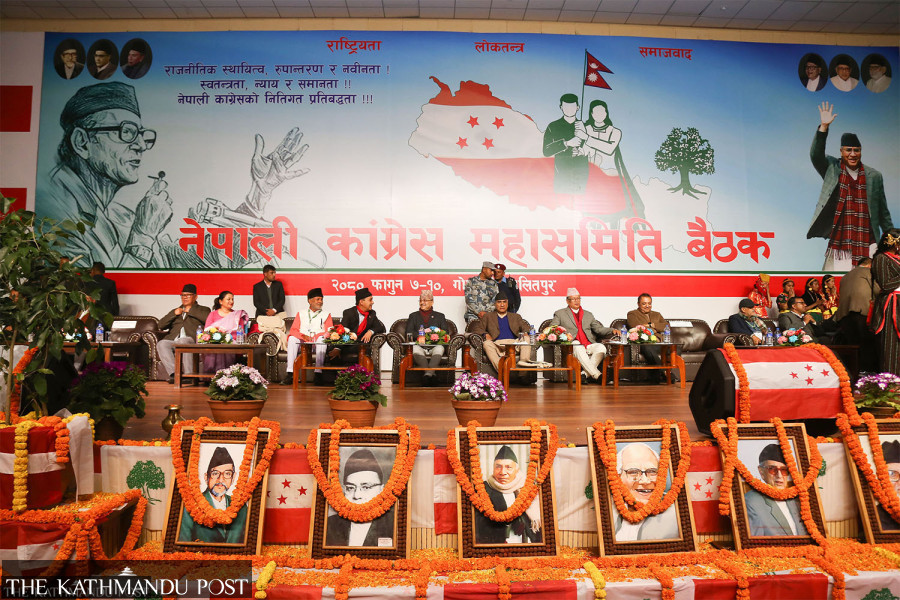Politics
Nepali Congress seems to be uniting on fighting elections with own might
Deuba, a vocal supporter of poll alliances, now publicly backs a proposal to go to the elections independently.
Post Report
The Nepali Congress Mahasamiti in February last week endorsed party general secretary Gagan Thapa’s proposal to contest next elections single-handedly—with a condition. The condition was that the party’s Central Working Committee would have the final word on the issue based on the feedback received in the Mahasamiti.
The gathering had come to such an ambiguous decision as party President Sher Bahadur Deuba was dead against Thapa’s proposal.
Over a month later, even Deuba’s establishment faction seems to have embraced the anti-electoral alliance agenda.
In the Mahasamiti meeting in Kathmandu, General Secretary Thapa had presented a report stating that the party should contest the general elections on its own in order to retain the trust and support of its cadres and well-wishers.
But the establishment faction led by party president Deuba opposed the idea, arguing that electoral alliances result from the need of the hour. The issue shouldn’t be decided four years ahead of the elections.
Over five weeks after conclusion of the party jamboree, Deuba has toed the same line and stated that the Congress should contest the coming elections single-handedly and win a majority.
“I instruct all friends to work together to gain the majority for the party [in next elections],” Deuba said while addressing a party’s function in Kathmandu on Saturday. Time, he said, had come for the party to contest the elections without leaning on any other party.
Deuba’s appeal to the party members comes on the nomination day for the April 27 bypolls. Candidates from various political parties on Saturday filed their candidacies for a House of Representatives seat in Ilam-2 and a provincial seat in Bajhang.
In Ilam, the CPN (Maoist Centre) has extended its support to the candidate of CPN-UML while the Congress candidates have so far not joined hands with other parties in Ilam, or in Bajhang.
When Thapa at the Mahasamiti meeting presented the proposal to contest the elections without tying up with other forces, it triggered a shock wave not only in the Congress but also in the CPN (Maoist Centre), the erstwhile partner of the ruling coalition.
Prime Minister Pushpa Kamal Dahal made it an excuse to remove the Congress from the government. The Congress, the Maoist Centre and three smaller parties had formed an alliance and jointly contested the local, provincial and federal elections. The Congress emerged the largest party in the House of Representatives, in all seven provinces and local units in the 2022 elections.
Dahal broke the alliance and joined hands with the UML to become prime minister in December that year. Within months, he ditched the second-largest party UML and re-engaged with the Congress.
Over a year later, on March 4, the prime minister again broke its ties with the Congress and formed a coalition with the UML, the Rastriya Swatantra Party and smaller parties. “One should understand that forming a pre-election alliance is not a regular political exercise in a democracy, but a compulsion done in a specific situation,” Thapa had stated in his political document presented in Mahasamiti. “Realising this fact, we will contest future periodic elections on our own strength and we will ensure that our voters can cast their votes on the Nepali Congress’ election symbol.”
“In the last local, provincial and federal elections, due to our alliance in several electoral constituencies, our supporters and well-wishers could not vote for the party,” Thapa had said while reading out his report. He had said Congress backers in 74 electoral constituencies were unable to vote for their party’s candidates and were instead compelled to solicit votes for candidates of other alliance partners.
Now Deuba is trying to convince party members with similar arguments. “The situation is evolving in such a way that we have to win the majority in the coming elections by contesting alone—and I urge you all to work to that end,” said Deuba. “It has become imperative for the Nepali Congress to gain majority in next elections single handedly.”
Besides the Congress, parties like the UML, the Maoist Centre, and the Swatantra Party have also vowed to contest the elections without forging alliances.
“I do not need to explain any more about the present political situation of the country. You are aware of it. So in view of the current situation, we have to make the party stronger so that we can win the majority by contesting the next elections alone,” said Deuba. “It has become imperative for us to come together in a better and coordinated way.”
Despite Deuba’s call for unity among Congress leaders, factional feud has historically been a major cause of the party’s poor performance in elections and while in the government.
Deuba also urged party members to end the years-old ill practice of betraying party colleagues and taking revenge especially at the time of elections. “I urge all friends to unite and strengthen the party.”
In order to achieve this goal, “we have to work from now on,” said Deuba, stressing the role of local party leaders and cadres towards that end.




 18.12°C Kathmandu
18.12°C Kathmandu














